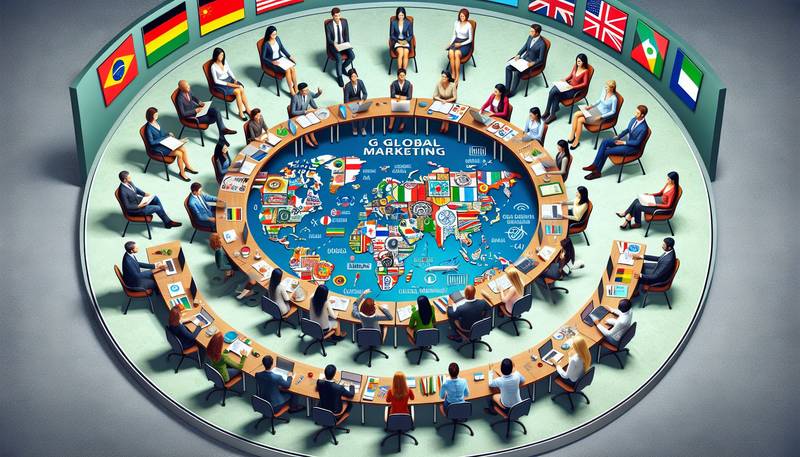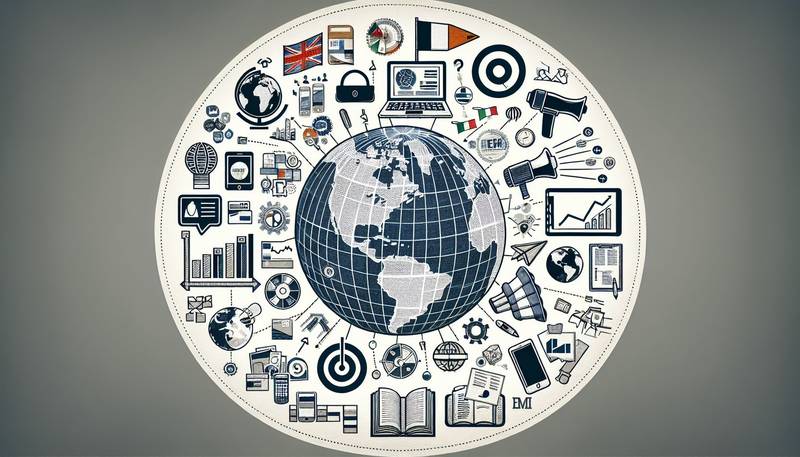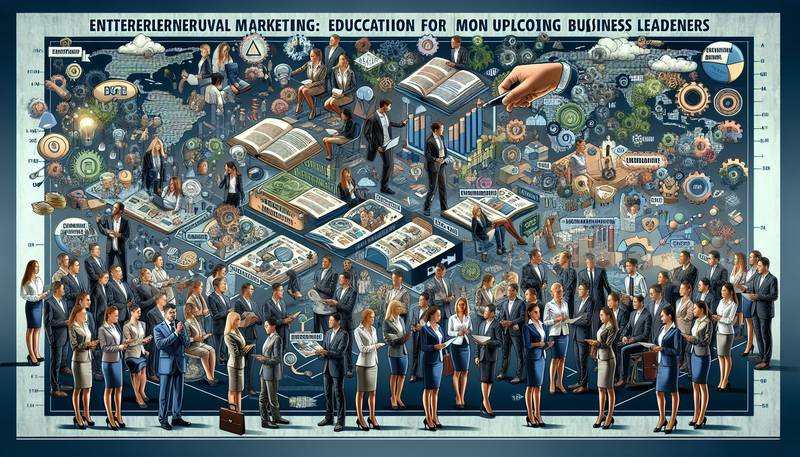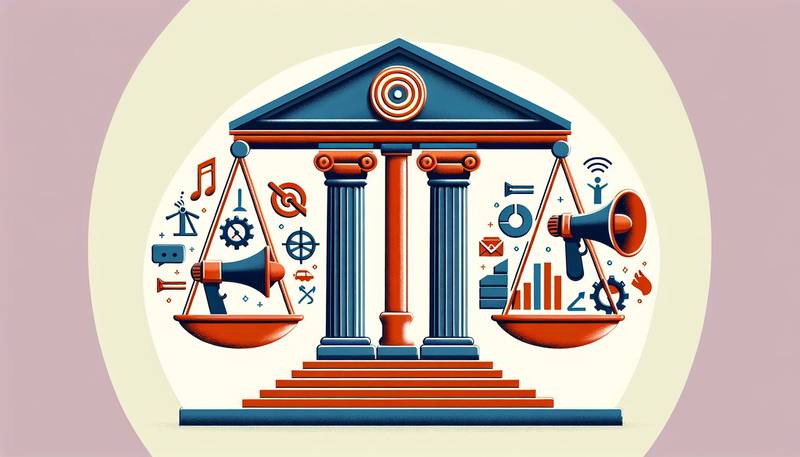Sustainability and Ethics in Modern Marketing Education
Marketing education has undergone significant changes in recent years, as the field has evolved to meet the demands of a rapidly changing business landscape. One of the most important and pressing issues facing marketing education today is the need to incorporate sustainability and ethics into the curriculum.
- 2/27/2024
- 4 min read
 Click
to read the article
Click
to read the article
As businesses increasingly recognize the importance of sustainable practices and ethical behaviors, it is imperative that future marketing professionals are equipped with the knowledge and skills to navigate these complex issues.
The Importance of Sustainability in Marketing Education
Sustainability has become a key consideration for businesses in today's world, as climate change, resource depletion, and social inequality continue to pose significant challenges. In the field of marketing, sustainability has taken on greater importance as companies seek to align their brand values with the values of socially conscious consumers. Marketing education must therefore place a strong emphasis on teaching students about sustainable marketing practices, including how to incorporate sustainability into product development, branding, and communication strategies.
By integrating sustainability into the marketing curriculum, educators can help students understand the impact of their decisions on the environment and society, and prepare them to develop innovative solutions that address these challenges. This can include teaching students about the concept of the triple bottom line, which considers not only financial outcomes, but also social and environmental impacts. By instilling a sense of responsibility in future marketers, education can help create a more sustainable and ethical business environment.
The Role of Ethics in Marketing Education
Ethics is another critical component of modern marketing education, as businesses face increasing scrutiny over their practices and behaviors. From deceptive advertising to data privacy concerns, ethical issues permeate every aspect of the marketing industry. Educators must therefore ensure that students understand the ethical implications of their decisions and actions, and are able to make informed and ethical choices in their professional careers.
By teaching students about ethical theories and principles, educators can help them develop a strong moral compass that guides their decision-making process. This can include discussions about the ethical implications of marketing strategies, such as the use of manipulative advertising techniques or the targeting of vulnerable consumer groups. By fostering a culture of ethical awareness and accountability, marketing education can help create a new generation of marketers who prioritize ethical conduct and social responsibility in their work.
Integrating Sustainability and Ethics into the Marketing Curriculum
Incorporating sustainability and ethics into the marketing curriculum can be a challenging task, as these topics are often complex and multifaceted. However, there are several strategies that educators can employ to ensure that students receive a comprehensive education on these important issues. One approach is to integrate sustainability and ethics into existing marketing courses, by incorporating case studies, discussions, and assignments that focus on these topics.
Another strategy is to offer specialized courses or workshops that specifically address sustainability and ethics in marketing. By providing students with dedicated opportunities to explore these issues in depth, educators can ensure that they have a thorough understanding of the challenges and opportunities presented by sustainable and ethical marketing practices. Additionally, educators can invite guest speakers from industry or academia to share their expertise and insights on sustainability and ethics in marketing, providing students with a real-world perspective on these issues.
Conclusion
In conclusion, sustainability and ethics are critical considerations for modern marketing education, as businesses continue to grapple with the challenges of a rapidly changing world. By integrating these topics into the marketing curriculum, educators can help prepare students to navigate the complexities of the modern business environment, and empower them to make informed and ethical decisions in their professional careers. By fostering a culture of sustainability and ethical awareness, marketing education can play a crucial role in shaping the future of the industry and creating a more sustainable and responsible business community.
Recent posts
Random news

The Growth of E-commerce and its Impact on Marketing Education
- 2023-12-25T00:00:00Z

The Relevance of Guerrilla Marketing in Educational Curricula
- 2024-01-01T00:00:00Z

Teaching Customer-Centric Marketing Strategies
- 2023-12-30T00:00:00Z

Utilizing Case Studies in Marketing Education for Real-World Learning
- 2024-01-15T00:00:00Z

Sustainability and Ethics in Modern Marketing Education
- 2024-02-27T00:00:00Z

Leveraging Big Data in Marketing Education
- 2023-12-31T00:00:00Z

Personal Branding and its Importance in Marketing Education
- 2024-02-10T00:00:00Z

Adapting to Change: Agile Methodologies in Marketing Education
- 2024-02-14T00:00:00Z

The Intersection of Psychology and Marketing in Educational Programs
- 2024-01-14T00:00:00Z

Content Marketing: Crafting a Core Component of Marketing Education
- 2023-12-18T00:00:00Z

The Importance of Cultural Competency in Global Marketing Education
- 2024-01-15T00:00:00Z

Building a Successful Career in Marketing through Education
- 2024-01-04T00:00:00Z

The Power of Visual Storytelling in Marketing Education
- 2024-02-05T00:00:00Z

Influencer Marketing: Teaching the New Age of Endorsement
- 2024-02-09T00:00:00Z

Building Collaborative Skills in Marketing Students through Team-Based Projects
- 2024-02-10T00:00:00Z

Email Marketing: An Indispensable Skill in Marketing Education
- 2024-01-27T00:00:00Z

Blending Traditional and Digital Marketing in Education Programs
- 2024-02-20T00:00:00Z

Engaging Millennials and Gen Z in Marketing Education
- 2024-01-10T00:00:00Z

Branding Basics: An Essential Course in Marketing Education
- 2024-02-27T00:00:00Z

Mobile Marketing: Education for the Smartphone Era
- 2024-01-13T00:00:00Z

The Synergy between Marketing and Sales: An Educational Perspective
- 2024-02-26T00:00:00Z


Cross-Cultural Marketing Education: Preparing for Global Challenges
- 2024-03-02T00:00:00Z

Staying Ahead: Continuous Learning in Marketing
- 2023-12-04T00:00:00Z

From Concept to Market: The Product Development Process
- 2024-02-25T00:00:00Z

Personal Selling and Sales Management in Marketing Education
- 2023-12-30T00:00:00Z

How to Design an Effective Marketing Education Curriculum
- 2024-03-01T00:00:00Z

Teaching the Future: Predictive Analytics in Marketing Education
- 2023-12-03T00:00:00Z

Developing Leadership Skills through Marketing Education
- 2024-02-13T00:00:00Z

Marketing Automation: Teaching the Tools of Efficiency
- 2023-12-18T00:00:00Z

Crisis Management and Communication in Marketing Education
- 2024-01-14T00:00:00Z

How to Effectively Use Gamification in Marketing Education
- 2024-03-01T00:00:00Z

Understanding the Marketing Mix in Today's Digital World
- 2024-01-20T00:00:00Z

Understanding Consumer Behavior: A Foundation of Marketing Education
- 2024-01-07T00:00:00Z

Emerging Trends in Marketing Education for the 21st Century
- 2024-02-06T00:00:00Z

Mastering the Fundamentals of Marketing Education
- 2023-12-17T00:00:00Z

Integrating Customer Feedback into Marketing Educational Programs
- 2023-12-21T00:00:00Z

The Future of Marketing Education: Predictions and Preparations
- 2024-03-11T00:00:00Z

Integrating Digital Tools into Marketing Education
- 2024-02-22T00:00:00Z

Strategic Marketing Planning: A Key Focus in Marketing Education
- 2024-02-23T00:00:00Z

From Classroom to Career: Marketing Education Pathways
- 2024-03-04T00:00:00Z

The Advantages of Online Marketing Education
- 2024-02-23T00:00:00Z

The Impact of AI and Automation on Marketing Education
- 2023-12-11T00:00:00Z

Utilizing Virtual Reality in Marketing Education
- 2024-01-01T00:00:00Z

Collaborative Learning in Marketing Education: Benefits and Strategies
- 2023-12-30T00:00:00Z

The Significance of Customer Relationship Management in Marketing Education
- 2024-01-29T00:00:00Z

Public Relations and Its Role in a Marketing Education
- 2023-12-11T00:00:00Z

Search Engine Optimization: A Must-Have Skill in Marketing Education
- 2024-02-15T00:00:00Z

Innovation in Retail Marketing: Trends and Education
- 2024-03-07T00:00:00Z

Personal Branding 101: Teaching the Fundamentals in a Digital Age
- 2023-12-03T00:00:00Z

The Role of Experiential Learning in Shaping Tomorrow's Marketing Leaders
- 2024-02-16T00:00:00Z

Entrepreneurial Marketing: Education for Upcoming Business Leaders
- 2024-01-06T00:00:00Z

Building and Managing Strong Brands: A Marketing Education Focus
- 2024-02-05T00:00:00Z

The Benefits of Experiential Learning in Marketing Education
- 2024-01-05T00:00:00Z

Developing Effective Marketing Communications Strategies
- 2024-01-30T00:00:00Z

Creating Compelling Content: A Pillar of Marketing Education
- 2024-02-04T00:00:00Z

Viral Marketing: Strategies and Education
- 2024-01-22T00:00:00Z

Teaching the Importance of Market Research in Decision Making
- 2024-03-07T00:00:00Z

Teaching the Art and Science of Pricing Strategies in Marketing
- 2024-01-10T00:00:00Z

Challenges and Solutions in Teaching Marketing Ethics
- 2023-12-04T00:00:00Z

The Importance of User Experience (UX) in Marketing
- 2023-12-10T00:00:00Z

Direct Marketing Techniques in the Educational Curriculum
- 2023-12-21T00:00:00Z

The Evolution of Marketing Education in the Digital Era
- 2023-12-14T00:00:00Z

The Role of Social Media in Modern Marketing Education
- 2024-03-10T00:00:00Z

Digital Advertising: A Core Subject in Marketing Education Today
- 2024-02-02T00:00:00Z

Teaching the Legal Aspects of Marketing
- 2023-12-04T00:00:00Z

Web Analytics and Digital Insights for Marketing Professionals
- 2024-01-05T00:00:00Z

The Role of Storytelling in Effective Marketing Education
- 2023-12-26T00:00:00Z

Sustainability and Ethics in Marketing: Incorporating Modern Values into Education
- 2024-02-23T00:00:00Z

Leveraging Social Media in Marketing Education: Opportunities and Challenges
- 2024-01-08T00:00:00Z

Nurturing Creativity and Innovation in Marketing Students
- 2024-02-13T00:00:00Z

Bridging the Gap between Theory and Practice in Marketing Education
- 2024-01-05T00:00:00Z

The Role of Internships in Enhancing Marketing Education
- 2023-12-25T00:00:00Z

The Importance of Analytics in Marketing Education
- 2024-02-25T00:00:00Z

The Role of Design Thinking in Marketing Education
- 2023-12-06T00:00:00Z

The Importance of Creativity in Marketing Education
- 2024-01-16T00:00:00Z

Event Marketing: Education for Memorable Brand Experiences
- 2024-01-21T00:00:00Z

Evaluating Marketing Education: Metrics for Success
- 2023-12-18T00:00:00Z

Global Marketing Strategies: Education for a Borderless World
- 2024-02-07T00:00:00Z

Navigating the World of Affiliate Marketing in Educational Programs
- 2024-01-15T00:00:00Z

The Importance of Networking in Marketing Education
- 2024-01-30T00:00:00Z

B2B Marketing: Developing Skills for the Business Market
- 2023-12-25T00:00:00Z

How Technology is Reshaping Marketing Education
- 2024-01-27T00:00:00Z

The Evolution of Marketing Education: Preparing Students for a Data-Driven World
- 2023-12-21T00:00:00Z

Effective Use of Social Listening Tools in Marketing
- 2024-02-18T00:00:00Z

From Classroom to Boardroom: Real-World Applications of Marketing Theories
- 2024-02-04T00:00:00Z

Exploring the Intersection of Psychology and Marketing in Educational Programs
- 2024-02-16T00:00:00Z

Marketing for Social Impact: Education for Change
- 2023-12-10T00:00:00Z

Lifestyle Marketing: Connecting Brands with Consumers' Lives
- 2024-01-05T00:00:00Z

Developing a Global Mindset through Marketing Education
- 2024-02-23T00:00:00Z

Enhancing Digital Literacy in Marketing Education
- 2024-02-07T00:00:00Z

Adapting Marketing Strategies for the Non-Profit Sector
- 2024-03-04T00:00:00Z

Marketing to Millennials: Challenges and Strategies
- 2024-02-20T00:00:00Z

The Role of Data Privacy in Marketing Education
- 2023-12-19T00:00:00Z

The Art of Convincing: Persuasion Techniques in Marketing
- 2024-02-06T00:00:00Z

Preparing Marketers for the Challenges of Globalization
- 2024-01-25T00:00:00Z

Bridging the Gap: Integrating Digital Tools into Traditional Marketing Curriculum
- 2024-02-04T00:00:00Z

Crowdfunding as a Marketing Tool: An Educational Perspective
- 2023-12-11T00:00:00Z

Navigating the Future of Marketing Education: Trends and Innovations
- 2023-12-08T00:00:00Z

Cultivating Strategic Thinking in Marketers through Education
- 2023-12-06T00:00:00Z
 Marketing Minds: Unleashing Your Potential in the Modern Age
Marketing Minds: Unleashing Your Potential in the Modern Age